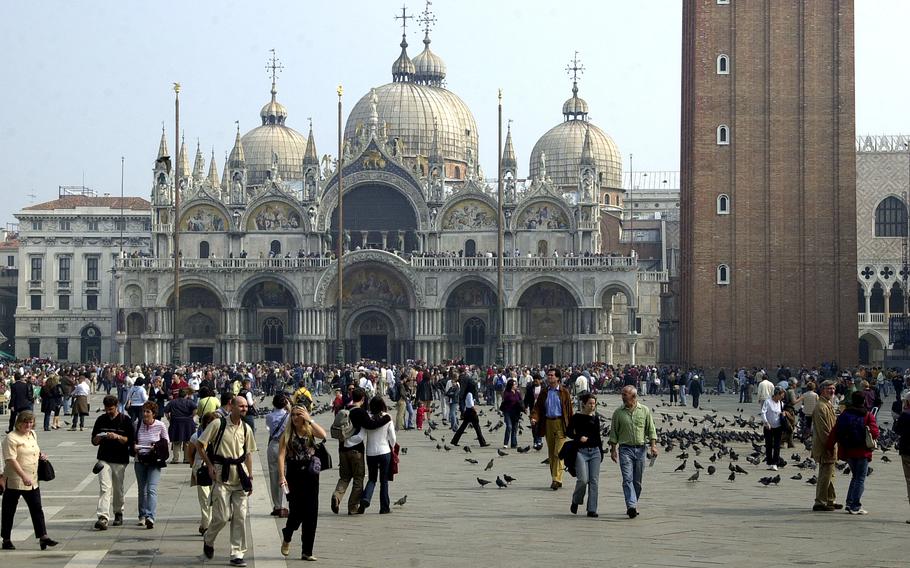
Tourists walk across St Mark's Square in Venice, Italy. The city is charging day-trippers a 5-euro tax on certain days in an effort to curb overtourism. U.S. military families stationed in Vicenza can request an exemption from the tax. (Michael Abrams/Stars and Stripes)
If you’re about to head off on your annual summer holiday, the anti-tourism protests in parts of Europe might be on your mind.
The movement has swept Spain in recent months, while Greece could also place restrictions on cruise ships visiting the country’s most popular islands from next year. But those seeking to curb over-tourism must be careful what they wish for.
I flagged in June that revenge travel was finally losing its appeal. Over the past week or so, this has become even more clear. So far, the decline in travel sentiment is most pronounced in the U.S. Europe is holding up, perhaps boosted by wealthy Americans traveling to Paris and Milan. But the danger is the market cools further, with weakness at the low end extending to richer consumers, while European holidaymakers also cut back.
Either way, these dynamics raise questions about what I’ll dub the carry-on trade: swapping spending on things, such as shoes and handbags, for experiences such as vacations and meals out.
After being unable to spread our wings during pandemic lockdowns, consumers around the world prioritized beach getaways and city breaks. Yet three years on, signs of travel fatigue are everywhere, exacerbated by the high prices for flights and hotel rooms that the bubble precipitated. Hence, U.S. hotels, airlines and online tour operators have delivered mostly muted outlooks for this year.
Airbnb Inc. said last week it was seeing some signs of weakening demand from American customers, who are booking closer to their time of travel. Expedia Group Inc., which operates both its namesake brand and Hotels.com, also said last week that it had seen a slowdown in July, primarily in the U.S.
The drop-off has been echoed by hotel chains including Hilton Worldwide, Hyatt Hotels and Marriott International, with Walt Disney Co. seeing fewer visitors to its U.S. theme parks this year.
To be sure, travel isn’t falling off a cliff. But it is a deceleration from the very strong rates of growth as economies reopened to something more pedestrian. There appears to have been some loss of appetite at the lower and middle segments of the market, as consumers balk at higher hotel and airfare prices and become more cautious ahead of the U.S. election.
Analysts at Bernstein suggest Gen Z has been slower to return to traveling than expected, perhaps one reason why Airbnb has seen a deceleration. Older, wealthier consumers are still splurging, particularly Americans taking advantage of the strong dollar to visit Europe. This may explain why, so far, the region is holding up.
TUI AG, the world’s biggest package tour operator, said summer bookings globally were up 6%, with some 88% of the program sold, both broadly in line with 2023.
But prices for summer holidays at TUI are up 3%, compared with 7% this time last year. TUI generally sells to wealthier travelers, one reason why it is still prospering. Last month, low-cost airline Ryanair Holdings Plc, more exposed to value-seeking customers, cut its outlook for ticket prices, warning of materially lower fares.
Nevertheless, the next few weeks will be crucial.
As in the U.S., Europeans are also booking very late, wanting to travel the next week or day. This has led to a so-called “lates” market, where airlines and tour operators seek to sell remaining seats and hotel rooms, and consumers can find a bargain. TUI said this process was progressing very well, after a slowdown in June and July, possibly reflecting the UEFA European Football Championships and Olympics.
Household finances, but also the weather, will play a part in how much is sold. In Britain for example, the summer had been poor, leading more people to book to go to Mediterranean beach resorts. But temperatures have now risen, perhaps persuading people to stay closer to home.
Our thirst for sun and sand will determine not just the fortunes of the travel industry, which make most of their profits in the summer season, but the direction of consumer spending.
Since emerging from Covid lockdowns, people on both sides of the Atlantic have prioritized experiences, including meals out and vacations, over things, with luxury goods being an obvious example. The holiday hiatus raises some doubt over whether the experience economy can continue to power ahead. That has implications for markets exporting tourists, but also the Mediterranean resorts that generate economic growth from travelers. Sales may shrink if more Americans and Europeans stay home and Chinese visitors don’t make up the shortfall.
From the clues over the past few weeks, it seems sunset cocktails and Mickey Mouse hats are in danger of going the same way as branded groceries and designer handbags.
This column does not necessarily reflect the opinion of the editorial board or Bloomberg LP and its owners.
Andrea Felsted is a Bloomberg Opinion columnist covering consumer goods and the retail industry. Previously, she was a reporter for the Financial Times.